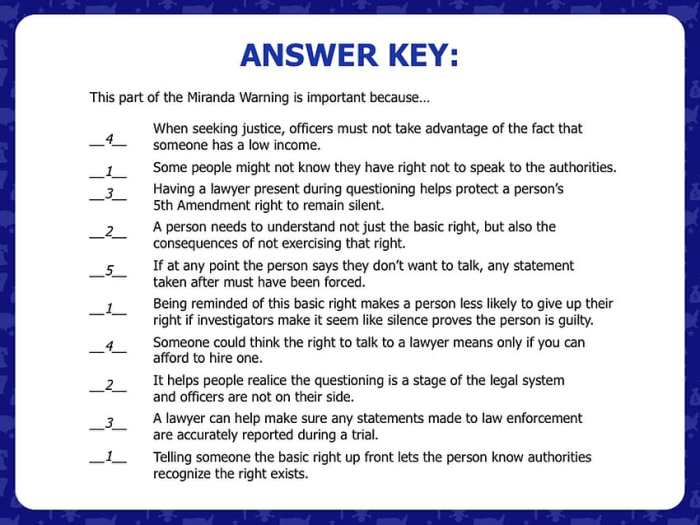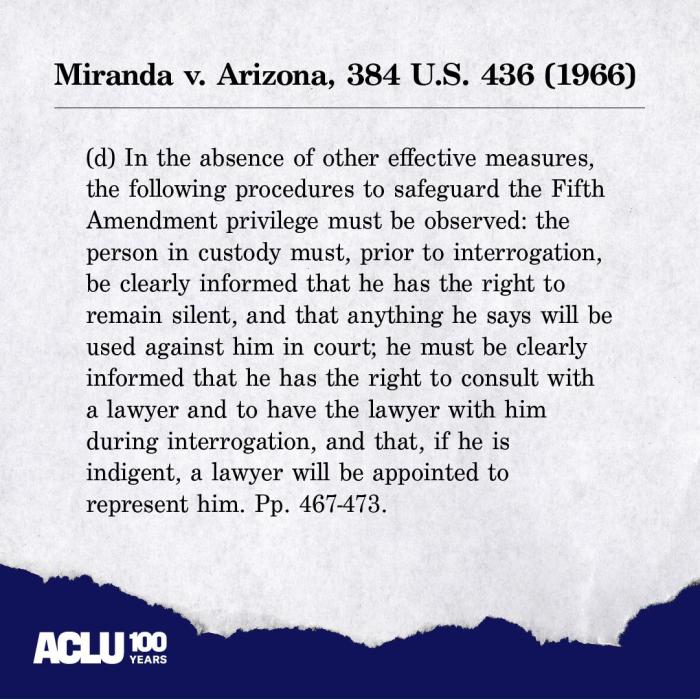Miranda v. arizona icivics answer key – In the realm of criminal justice, the Miranda v. Arizona I Civics Answer Key stands as a cornerstone, providing an indispensable understanding of the Miranda rights that safeguard individuals during custodial interrogations. This guide delves into the intricacies of Miranda rights, exploring their historical significance, legal implications, and practical applications within the American criminal justice system.
The Miranda warning, a series of prescribed statements, serves as a crucial protection for individuals facing interrogation. By informing suspects of their rights to remain silent, to have an attorney present, and to stop the interrogation at any time, Miranda rights empower individuals to make informed decisions that safeguard their constitutional rights.
Miranda Rights

Miranda rights are a set of constitutional protections that safeguard individuals from self-incrimination during custodial interrogations. They ensure that suspects are informed of their rights and have the opportunity to consult with an attorney before being questioned.
Overview of the Miranda Warning
The Miranda warning includes the following components:
- You have the right to remain silent.
- Anything you say can and will be used against you in a court of law.
- You have the right to an attorney. If you cannot afford an attorney, one will be appointed for you.
- You can stop answering questions at any time.
Historical Significance of Miranda v. Arizona
The Miranda rights were established in the 1966 Supreme Court case Miranda v. Arizona. In this case, the Court ruled that suspects must be informed of their rights before custodial interrogations and that any statements made without proper Miranda warnings are inadmissible in court.
Custodial Interrogations
Definition and Legal Implications
Custodial interrogations occur when a suspect is taken into custody and questioned by law enforcement officers. These interrogations carry significant legal implications because any statements made during them may be used as evidence against the suspect in court.
Factors Determining Custody
Whether a person is in custody for Miranda purposes depends on the following factors:
- The person’s freedom of movement is significantly restricted.
- The person is not free to leave the situation.
- The person is not aware of the reasons for their detention.
Examples of Custodial and Non-Custodial Interrogations
Examples of custodial interrogations include:
- Suspects arrested and taken to a police station for questioning.
- Suspects detained in a police car after being stopped for a traffic violation.
Examples of non-custodial interrogations include:
- Interviews with witnesses who are not under arrest.
- Conversations with suspects who are free to leave.
Exceptions to Miranda Rights: Miranda V. Arizona Icivics Answer Key
Public Safety Exception
One exception to the Miranda rule is the public safety exception. This exception allows law enforcement officers to question suspects without giving Miranda warnings if they reasonably believe that the suspect poses an imminent threat to public safety.
Examples of Public Safety Exception
Examples of cases where the public safety exception was successfully invoked include:
- Questioning a suspect about the location of a bomb.
- Interrogating a suspect about the whereabouts of a missing child.
Waiver of Miranda Rights

Concept and Requirements
Suspects can waive their Miranda rights, but the waiver must be knowing and voluntary. To determine if a waiver is valid, courts consider factors such as:
- The suspect’s age, education, and intelligence.
- The clarity and comprehensiveness of the Miranda warnings.
- Whether the suspect was under the influence of drugs or alcohol.
Examples of Valid Miranda Waivers
Examples of cases where Miranda rights were validly waived include:
- A suspect who is a college graduate and has no history of mental illness.
- A suspect who was given a clear and unambiguous Miranda warning.
Consequences of Miranda Violations
Exclusion of Evidence, Miranda v. arizona icivics answer key
Violating Miranda rights can result in the exclusion of any statements made by the suspect during the custodial interrogation. This evidence cannot be used against the suspect in court.
Examples of Miranda Violations
Examples of cases where Miranda violations led to the exclusion of evidence include:
- A suspect who was not informed of their right to an attorney.
- A suspect who was questioned after they invoked their right to remain silent.
Practical Implications of Miranda
Impact on Law Enforcement
Miranda rights can affect the ability of law enforcement officers to gather evidence and solve crimes. Some argue that Miranda hinders effective policing by preventing officers from obtaining confessions from suspects.
Balancing Public Safety and Individual Rights
The Miranda rule balances the public’s interest in protecting individuals from self-incrimination against the government’s interest in investigating and prosecuting crimes.
Criticisms of Miranda

Hindering Effective Policing
One criticism of the Miranda rule is that it hinders effective policing by preventing officers from obtaining confessions from suspects. Critics argue that this can lead to criminals escaping justice.
Protecting the Innocent
Supporters of Miranda argue that it protects the innocent by preventing false confessions. They point to cases where innocent individuals have been convicted based on confessions obtained without proper Miranda warnings.
Popular Questions
What are the key components of the Miranda warning?
The Miranda warning includes the right to remain silent, the right to an attorney, the right to stop the interrogation, and the statement that anything said can and will be used against the individual in court.
Under what circumstances do Miranda rights apply?
Miranda rights apply when an individual is in custody and is being interrogated by law enforcement officers.
Are there any exceptions to the Miranda rule?
Yes, there are exceptions to the Miranda rule, such as the public safety exception and the exigent circumstances exception.